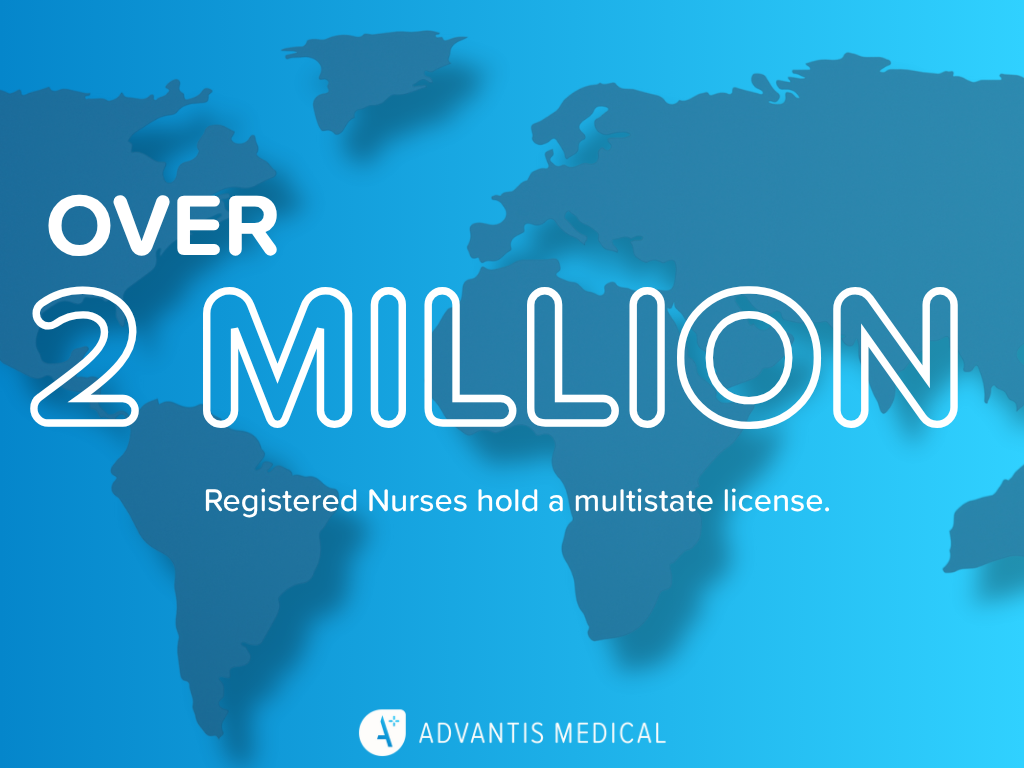Tired of juggling travel nurse applications and license renewal deadlines? Does it stress you out?
Don’t worry, you’re not alone.
The Nurse Licensure Compact (NLC) makes life so much easier. How?
With the NLC, you don’t have to worry about having to reapply for each state. Instead, you hold a multistate nursing license that allows you to practice across dozens of states, coast to coast.
In this guide, we’ll cover what you need to know from how the NLC works, new rules for 2026, licensing, and how to get started with a compact nursing license.
Be ready when the next life-changing opportunity calls. Are you ready for some freedom?
What Is the Nurse Licensure Compact?
With the Nurse Licensure Compact (NLC), participating states have agreed to let RNs, LPNs, and LVNs practice across NLC states. What does that mean for you?
Instead of worrying about applying for individual state licenses, you can apply once for a multistate license. Reduce paperwork, deadlines, and stress.
The National Council of State Boards of Nursing (NCSBN) keeps an official list of NLC states. It also enforces licensure standards, ensuring that patients receive the best possible care, regardless of location.
If your Primary State of Residence (PSOR), or homestate, is a member of NLC, they will issue your multistate license. The license will remain valid as long as you reside in your home state and maintain good standing. Practice in any compact state. The NLC license applies to both in-person and telehealth medical care.

Why the NLC Matters for Travel Nurses
“Even in my early days before I got into management, I had to get additional licenses to manage my patients. It was a necessary part of the job, but it could have easily been eliminated if all of the states recognized each other.” – Suzanne Kunze, MBA, RN, CCM, Pennsylvania.
Licensing is one of the biggest hassles for travel nurses. You have less career flexibility and have to keep track of multiple contracts and state requirements. But, with an NLC license:
- Start new assignments faster without waiting for individual state approval
- Accept contracts across 40+ compact states and 2 U.S. territories
- Cut down on paperwork and renewal fees
- Expand into telehealth or rapid-response roles
- Enjoy real freedom and work-life balance
To make the most of these benefits, stay current on the latest NLC rules and updates.
NLC Rules and Updates for 2026
1. The 60-Day Relocation Rule
In 2024, the 60-day Residency Rule was implemented. Nurses who move from one compact state to another have to apply for a new license in their new Primary State of Residence within 60 days.
Your original license stays valid during the transition if you apply within this timeframe. Stay updated with the latest NCSBN 60-Day Rule FAQ sheet.
2. More NLC States
As of 2026, more than 40 states and two territories that have enacted the NLC. See the official compact nursing license state map for the current membership list.
3. Advanced Practice Registered Nurses Compact (APRN)
The APRN Compact recently gained momentum. Currently, Delaware, North Dakota, South Dakota, and Utah issue multistate APRN Compact licenses for RNs who have over 2,000 practice hours.
The APRN Compact offers additional service opportunities in telehealth and disaster relief, as well as providing opportunities for military spouses.
4. Telehealth and Multistate Practice
The NLC allows nurses to deliver care remotely to patients in compact states. Travel nurses can serve rural patients in remote areas, homebound seniors, low-income families, and other people who need telehealth.
Visit the U.S. Department of Health and Human Services – Interstate Licensure Compacts website for more details.
Current Nurse Licensure Compact (NLC) States
| Alabama | Louisiana | Ohio | Washington |
| Arizona | Maine | Oklahoma | West Virginia |
| Arkansas | Maryland | Oklahoma | Wisconsin |
| Colorado | Mississippi | Pennsylvania | Wyoming |
| Connecticut | Missouri | Rhode Island | |
| Delaware | Montana | South Carolina | |
| Florida | Nebraska | South Dakota | |
| Georgia | New Hampshire | Tennessee | |
| Idaho | New Jersey | Texas | |
| Indiana | New Mexico | Utah | |
| Iowa | North Carolina | Vermont | |
| Kansas | North Dakota | Virginia |
Primary State of Residence (PSOR)
Your home state determines which state board approves your multistate nursing license. To qualify, you must:
- Live in a compact state
- Have a valid, unencumbered license
- Pass the NCLEX-RN or NCLEX-PN
- Complete fingerprint-based background checks
Moving can affect your license. For example, if you move to another compact state, you’ll need to apply for a new license within 60 days.
Uniform Licensure Requirements
For all NLC states, travel nurses must meet Uniform Licensure Requirements (ULRs):
- Graduated from an approved nursing program
- Pass the NCLEX exam
- No felony convictions or nursing-related misdemeanors
- Have a valid U.S. Social Security Number
- Meet all PSOR continuing-education and renewal rules
Learn more about the ULRs in the NCSBN Uniform Licensure Requirements.
Compact vs. Single-State Nursing Licenses
Not all states are part of the NLC. When you’re looking up travel nurse jobs, find out which states offer NLC licenses. Save on fees, time, and paperwork.
Compact License
- No need for multiple state licenses
- Can practice in all compact states
- Must live in an NLC state
- Stays active as long as you’re in good standing
Single-State License
- Issued by non-compact states like California, Oregon, New York, and Washington.
- Only valid in one state
- Need to apply for licensure by endorsement to work in other states
Additionally, relocating can affect your license. If you move from a compact to a non-compact state, your multistate privileges end. You’ll need to apply for a single-state license.
How to Get a Compact Nursing License
If you’re wondering how to get a compact nursing license, here’s the quick path:
- Check that your primary state of residence is an NLC member.
- Meet all Uniform Licensure Requirements.
- Apply for licensure through your state board of nursing.
Once approved and your license is upgraded to “multistate” you will have privileges in every other compact state. If your state isn’t a member, you’ll have to maintain separate licenses.
How to Verify Your Nursing License
You can verify your status through Nursys.com, the official national nurse license verification database.
Setup is pretty easy. Create an account to see all active and inactive licenses and confirm your compact status.
Don’t forget to sign up for Nursys e-Notify, a free alert system that tracks renewals and status updates. It’s a lifesaver for travel nurses managing several credentials.
APRN Compact: Separate Pathway for Advanced Practice Nurses
If you’re an NP, CRNA, CNS, or CNM, you’ll still need individual state licenses as of 2026. The APRN Compact will enable multistate practice once seven states enact it.
Currently, North Dakota, South Dakota, Utah, and Delaware have enacted the APRN Compact. Five other states, including New York and Arizona, have pending legislation.
Ready to Get Started?
Understanding the NLC is just the beginning. Now it’s time to conquer your state’s requirements. Sounds scary? Don’t worry. We’ve made it easy for you.
Check out our state-by-state nursing license guides for exact application steps, fees, and renewal info for your home state and next assignment.
Browse the Advantis Nursing License and Renewal Guide by State now.
Fast-Track Your Career with Advantis Medical’s Expert Licensing Support
See how our dedicated licensing team helps travel nurses simplify the entire process — from endorsement to renewal — so you can start your next assignment faster.
Ready to Find Your Next Travel Nursing Adventure?
Now that you know how to work across multiple states, it’s time to put that flexibility to work.
At Advantis Medical, we don’t just help you understand the NLC. We help you leverage it to land your dream travel assignment.
Why thousands of travel nurses choose Advantis Medical as their #1 agency:
- Top-Rated Agency: Voted the #1 Travel Nursing Agency by our clinicians, with 700+ verified 5-star reviews from nurses like you.
- Pro Recruiters Who Get It: Your dedicated recruiter is your career champion, focused on finding you the best-fit positions and making sure you feel supported every step of the way.
- Exclusive, High-Pay Jobs: Gain access to our network of top-tier hospital partners across the U.S. with opportunities you won’t find elsewhere.
The Advantis Difference means a stress-free journey, unparalleled clinical support, and a commitment to your career growth.
Your multistate license is your ticket to freedom. Let us help you book the journey.
Find Your Next High-Paying Travel RN Job Now!









